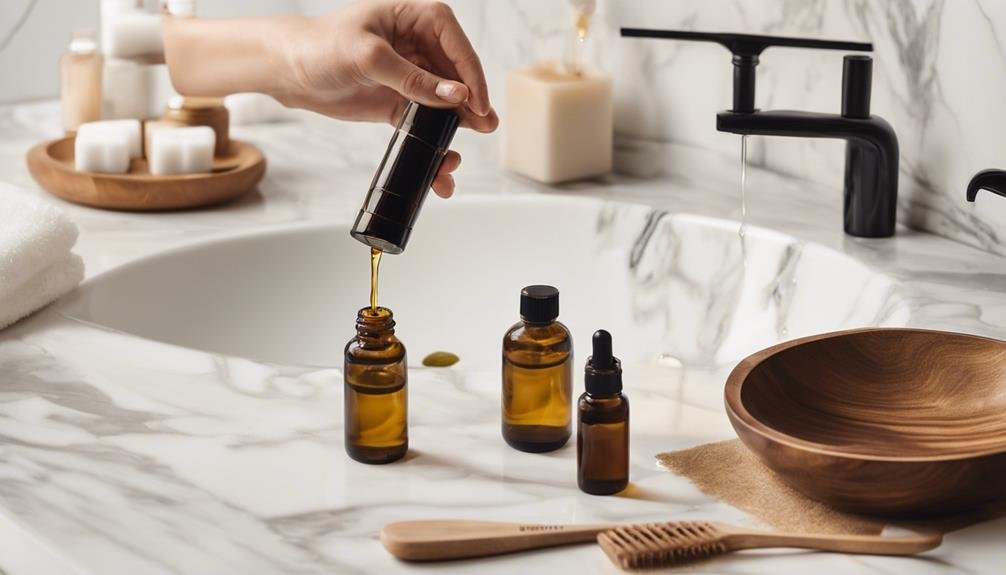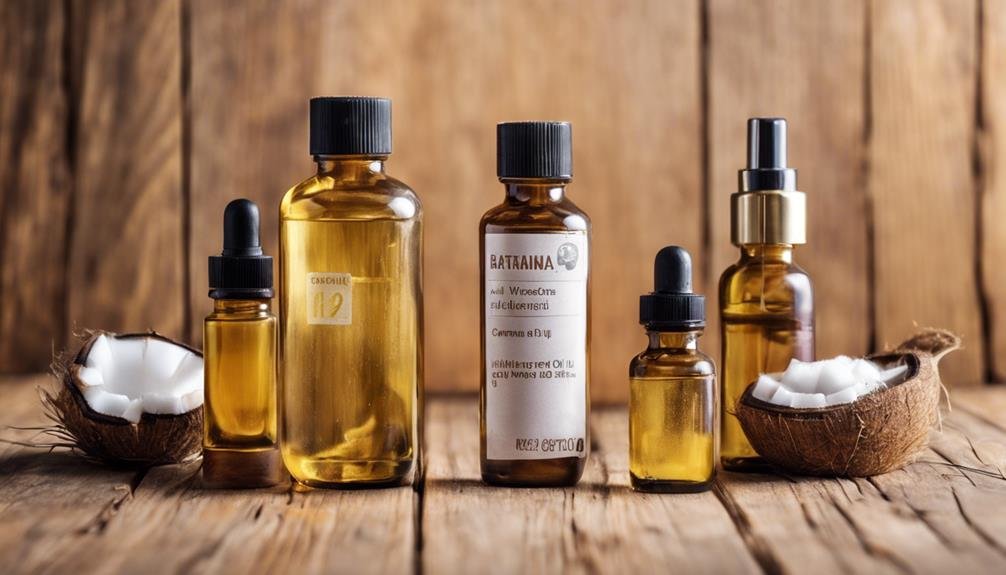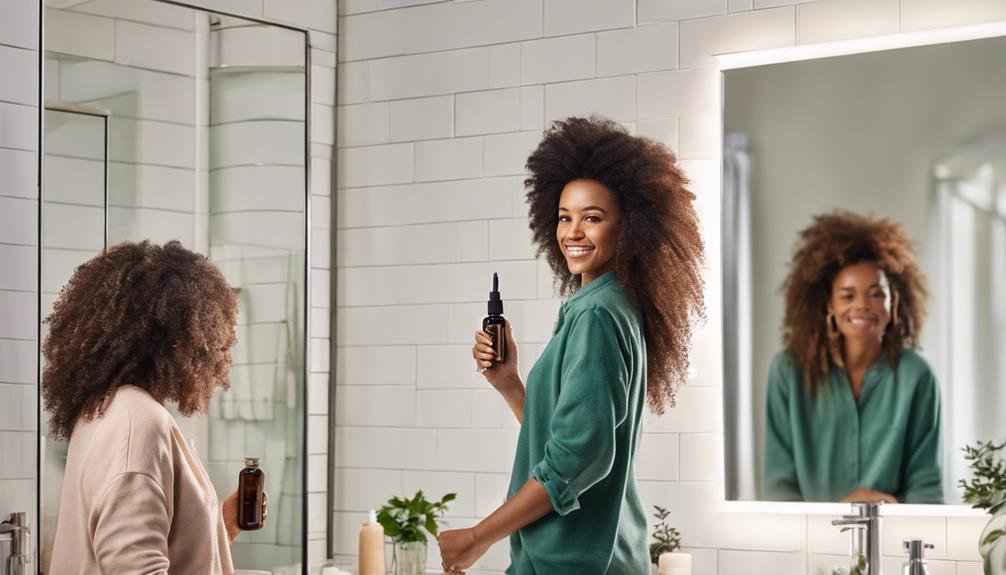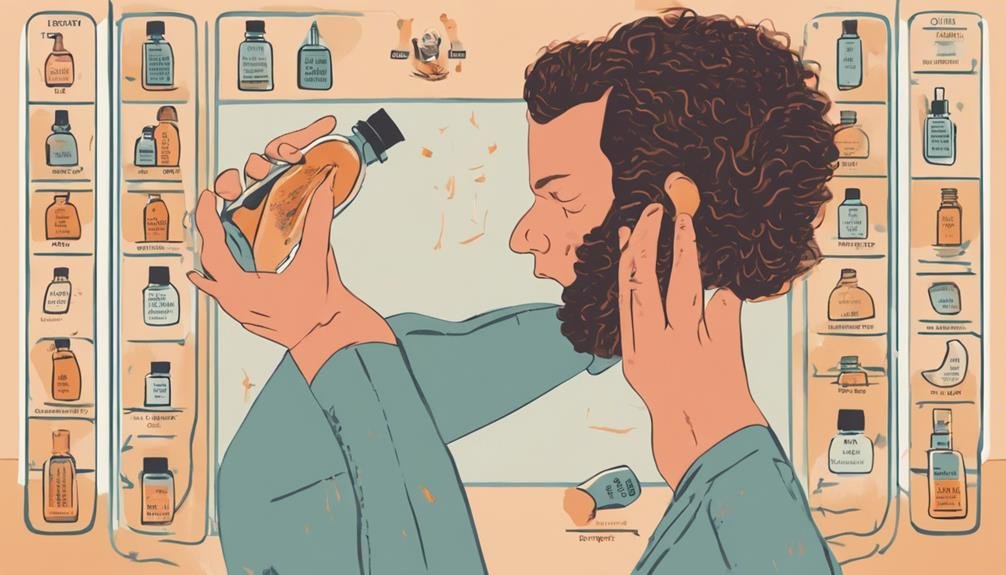You've probably tried various remedies to combat hair thinning, but have you considered batana oil? Extracted from the American palm tree, this oil is rich in essential fatty acids and vitamin E, which are known to nourish the scalp and strengthen hair. While the direct link between batana oil and hair loss prevention is still under investigation, many users report noticeable improvements in hair texture and a reduction in breakage. If you're curious about how this natural oil compares to other treatments, and whether it could be the right solution for your hair care needs, you might find the upcoming comparisons and user testimonials particularly enlightening.
Key Takeaways
- Batana oil is rich in fatty acids and vitamin E, which nourish the scalp and may prevent hair thinning.
- Regular application promotes scalp health and enhances blood circulation, supporting hair growth.
- Anecdotal evidence suggests that batana oil strengthens hair and improves its texture, potentially reducing hair loss.
- Mixing batana oil with rosemary oil can boost scalp health and combat thinning, with rosemary oil scientifically backed to stimulate hair growth.
- Consistent use of batana oil as a pre-shampoo or conditioning treatment can improve hair density and reduce breakage.
Understanding Batana Oil
Batana oil, derived from the nuts of the American palm tree Elaeis oleifera, holds a cherished spot in the hair care routines of indigenous tribes across Central and South America. Famed for its ability to nourish the hair and promote scalp health, batana oil is a natural remedy often turned to for combating thinning hair.
It's not just tradition that supports its use; the oil is rich in fatty acids like oleic and linoleic acids, which deeply moisturize the hair, reducing breakage and fostering a stronger, more resilient mane.
Moreover, the high levels of vitamin E in batana oil act as a powerful antioxidant. This isn't just good news for your hair's appearance; it's essential for your scalp health, too. Vitamin E helps protect your scalp from oxidative stress, creating a healthier environment that may encourage hair growth.
You're not just applying an oil; you're applying a protective barrier that helps shield your scalp and hair from damage.
To get the most out of batana oil, consider integrating it into your hair care routine. Apply it directly to your scalp and hair, either 2-3 times a month or weekly if your hair is particularly dry.
This regular application can maximize the benefits, helping to maintain the health of your hair and scalp, and potentially keeping thinning hair at bay.
Nutritional Profile
Delving into the nutritional profile of batana oil reveals why it's so beneficial for hair health. Batana oil is packed with essential fatty acids like oleic, linoleic, and palmitic acids. These aren't just fancy names; they deeply moisturize and nourish your hair, enhancing its overall health and resilience against thinning.
What's more, batana oil is a powerhouse of vitamin E, a potent antioxidant. This isn't just good news; it's great because vitamin E protects your hair cells from oxidative damage, which can lead to hair thinning. You're not just maintaining your hair; you're actively fighting against potential damage.
But there's more to this oil. It includes carotenoids such as alpha and beta carotenes that play a critical role in supporting your scalp health. They deliver essential nutrients directly where your hair needs them the most.
Plus, lycopene, another superhero antioxidant in batana oil, helps shield your scalp from environmental damage.
Together, this blend of antioxidants, essential fatty acids, and carotenoids in batana oil doesn't just nourish; it strengthens your hair, boosts its elasticity, and helps prevent breakage and thinning. You're not just using an oil; you're fortifying your hair for the future.
Application Methods

To effectively combat hair loss with batana oil, it's crucial to master the best application techniques.
You'll learn how to integrate these methods into your routine, ensuring you're using the oil in a way that maximizes its benefits without overwhelming your hair.
We'll explore tips for regular application, whether you're dealing with dry, coarse, or fine hair types.
Optimal Application Techniques
When applying batana oil to combat hair loss, it's vital to use the correct techniques to maximize its benefits. Start by applying the oil directly to your scalp. Use your fingertips to massage it in circular motions for 3-5 minutes. This not only spreads the oil evenly but also stimulates blood circulation, promoting healthier hair growth and tackling thinning.
For deeper nourishment, you can use batana oil as a pre-shampoo treatment. Apply it generously from scalp to ends, and leave it on for at least 30 minutes or, if possible, overnight. This guarantees that your hair and scalp absorb all the moisture and nutrients, enhancing the overall health and strength of your hair.
Incorporate batana oil into your regular hair care routine by mixing it with your conditioner or a hair mask. This addition helps maintain ideal moisture levels, vital for preventing hair breakage and encouraging volume.
However, remember that a little goes a long way, especially if you have fine hair. Too much oil can weigh your hair down.
Here's a quick reference table on how to apply batana oil:
| Technique | Description |
|---|---|
| Direct Scalp Application | Massage oil into the scalp to boost circulation and promote hair growth. |
| Pre-shampoo Treatment | Leave oil on for 30 minutes to overnight for deep nourishment. |
| Mix with Conditioner | Enhance moisture and nourishment by combining oil with your conditioner. |
| Frequency of Application | Apply 2-3 times a month, or weekly for very dry hair. |
| Application Amount | Use sparingly on fine hair to avoid excess weight. |
Routine Integration Tips
Integrating batana oil into your hair care routine can transform the health and appearance of your hair. Start by using it as a pre-shampoo treatment. Simply massage the oil into your scalp and through your hair for 3-5 minutes before washing. This won't only enhance moisture retention but also help reduce breakage, supporting overall hair growth.
For deep conditioning, apply batana oil as a hair mask. Leave it on your scalp and hair for a few hours or even overnight. This allows the oil's rich nutrients to deeply penetrate, improving elasticity and adding shine to your hair. If your hair is particularly dry, consider doing this weekly; otherwise, 2-3 times a month should suffice.
You can also mix batana oil with your regular conditioners or masks to amplify their moisturizing effects. Tailor the mixture to suit your hair type's needs, ensuring you don't weigh down finer strands.
Don't forget to apply batana oil to protective styles like twists or braids. It helps lock in moisture and protects your hair from environmental damage, maintaining scalp health and enhancing the longevity of your styles.
Hair Growth Evidence
Rich in vitamin E, batana oil offers antioxidant properties that may shield your hair follicles from damage and enhance scalp health. This nourishing oil is packed with essential fatty acids like oleic and linoleic acids, which aren't just buzzwords; they genuinely nourish your hair, fostering a healthier scalp that could potentially reduce hair thinning.
Though batana oil has been a staple in indigenous tribes' hair care routines, promising to bolster hair strength and improve texture, it's important to temper expectations. While you might feel tempted to count on it as a miracle remedy for hair loss, scientific backing is scant.
Studies specifically pinpointing batana oil's efficacy in stimulating hair growth are limited. Anecdotal evidence suggests some benefits—users often celebrate smoother, stronger hair—but these outcomes are subjective and can vary widely.
Don't forget, while batana oil can be a beneficial addition to your hair care arsenal, particularly for its qualities to nourish hair and possibly prevent breakage, relying solely on it for hair growth or as a primary treatment for hair loss isn't advisable.
Each person's experience might differ, making it essential to approach this natural remedy with a balanced perspective.
Comparing Hair Oils

Several hair oils, including batana, castor, and rosemary oil, each offer unique benefits for hair care, but it's crucial to understand their differences to choose the best option for your needs.
Batana oil, rich in fatty acids and vitamin E, is renowned for its nourishing properties that maintain scalp health and prevent dryness, potentially reducing hair thinning. Its density makes it ideal for managing thick, curly, or coarse hair. However, if you've got finer strands, you might find it too heavy and greasy.
On the other hand, castor oil is celebrated for its ricinoleic acid content, which promotes healthier hair growth by improving blood circulation to the scalp. It's a go-to for those struggling with hairline receding or thinning patches.
Meanwhile, rosemary oil is backed by more substantial scientific evidence in stimulating hair growth compared to batana oil. Studies suggest that it can effectively enhance hair thickness and growth, making it a compelling choice for those experiencing hair loss.
Incorporating a mix of these oils could offer a balanced approach to hair care. While each has its strengths, using them together might enhance your scalp's health and combat thinning more effectively.
Choose based on your specific hair type and condition for the best results.
Alternative Treatments
While exploring various hair oils can provide some benefits, you may want to contemplate other effective treatments if you're dealing with significant hair loss.
Besides Batana oil, which is celebrated for its natural ingredients and benefits to scalp health, there are several alternative treatments you might consider to prevent hair loss and promote hair growth.
Here are a few options:
- Essential Oils: Rosemary and peppermint oils can improve scalp circulation, potentially enhancing hair growth.
- Pumpkin Seed Oil: Known for its phytosterol content, this oil may increase hair thickness and density.
- Minoxidil: This over-the-counter treatment has been proven to stimulate hair regrowth in cases of androgenetic alopecia.
- Microneedling with PRP: A combination of microneedling and platelet-rich plasma therapy that regenerates hair follicles, promoting recovery and growth.
- Low-Level Laser Therapy (LLLT): A non-invasive treatment that uses laser light to stimulate hair follicles, increasing hair density.
Each of these treatments offers a different approach to tackling hair loss, from natural solutions to medical interventions.
They can be used in conjunction with products like Batana oil to maximize hair health and combat thinning effectively.
User Testimonials

User testimonials often serve as a compelling indicator of a product's effectiveness. When it comes to Batana oil for hair loss, you'll find numerous accounts praising its impact on thinning hair. Users highlight how regular application has not only reduced hair shedding but also increased hair thickness. It's not just about slowing thinning; it's about promoting growth and enhancing scalp health. Many users also report that batana oil has helped in nourishing their scalp, reducing dandruff, and improving overall hair quality. These batana oil benefits for hair loss have made it a popular choice among those looking for natural remedies to combat thinning hair. With such positive testimonials, it’s clear that batana oil has become a trusted solution for many struggling with hair loss.
The moisturizing properties of Batana oil come up often in these stories. You might notice your hair getting not only stronger but also smoother and shinier. Imagine having softer hair that actually feels good to touch—because that's what many say they experience.
Still skeptical? You're not alone. Many were hesitant at first, given the mixed reviews online. But patience seems to pay off, with users expressing satisfaction after allowing time for results to manifest. Here's a quick glance at what some users are saying:
| User | Experience | Result |
|---|---|---|
| Jane | Reduced shedding, increased thickness | Positive |
| Mark | Enhanced shine, moisturizing effect | Positive |
| Lisa | Nourished scalp, healthier growth environment | Positive |
These testimonials illustrate just how transformative Batana oil can be for your hair care routine.
Product Accessibility
After seeing the promising results from users like Jane, Mark, and Lisa, you might be wondering where you can get your hands on batana oil.
Fortunately, due to the growing consumer awareness and popularity of natural hair care remedies, batana oil has become widely accessible.
Here's a quick guide to help you find this remarkable product:
- Beauty Retailers: Many local and chain beauty stores now carry a range of batana oil-infused hair care products.
- Online Platforms: Websites like Amazon, eBay, and specialty natural health sites offer pure batana oil and related products with the convenience of home delivery.
- Specialty Health Stores: These shops often stock pure batana oil and organic hair care products featuring batana oil.
- Ethnic Markets: Look for batana oil in its purest forms in these markets, which cater to specific cultural preferences and natural remedies.
- Social Media Influencers: Follow influencers who specialize in natural hair care for updates on the latest and most effective batana oil products.
Whether you're on a tight budget or looking to splurge a little, batana oil's availability across different platforms and price points guarantees you can easily integrate it into your hair care routine.
Potential Side Effects

While batana oil is largely safe, you might still experience some side effects.
If you have nut allergies, be cautious, as the oil comes from the nuts of the American palm tree and could trigger allergic reactions.
Additionally, the oil can cause scalp irritation or dermatitis, so it's wise to do a patch test before using it extensively.
Allergic Reaction Risks
Although batana oil is celebrated for its benefits in combating hair loss, it's important to be aware of potential allergic reactions. As with any natural product, not everyone reacts the same way, and what works wonders for one person might cause discomfort for another.
Firstly, you should always perform a patch test before fully integrating batana oil into your hair care routine. This simple step can prevent any severe allergic reactions. Pay attention to how your scalp and skin respond in the following 24 to 48 hours. If you notice any redness, itching, or a burning sensation, it's best to discontinue use immediately.
Sensitive scalps might react differently to batana oil due to its density, which can leave a greasy residue. This residue can exacerbate scalp irritation or even lead to adverse reactions if your scalp is particularly sensitive.
Here are key considerations to remember:
- Allergic reactions: Look out for signs like itching or swelling.
- Scalp irritation: Redness and discomfort might occur.
- Patch test: Essential to determine suitability.
- Allergic dermatitis: Stop use if symptoms like severe itching or blistering appear.
- Greasy residue: Can be troublesome for fine or sensitive hair types.
Always check the product labels to avoid unwanted allergens and minimize the risk of adverse reactions.
Dermatitis and Irritation
As you consider using batana oil to address hair loss, it's important to be mindful of its potential to cause dermatitis and irritation, especially if you have sensitive skin or a history of nut allergies.
While batana oil is celebrated for its hair strengthening properties, it can lead to scalp irritation or allergic dermatitis for some users.
Before fully integrating batana oil into your hair care routine, performing a patch test is a smart move. Apply a small amount of the oil to a discreet area of your skin and wait for any signs of an allergic reaction, such as redness, itching, or a burning sensation.
These symptoms indicate that batana oil mightn't be suitable for your skin type.
If you experience any of these reactions, it's best to discontinue use immediately to avoid further irritation or damage to your scalp.
Persistent symptoms after stopping might require a consultation with a dermatologist to better understand your skin's sensitivity and to explore other hair loss treatment options that might be more appropriate for your skin type.
Nut Allergy Warnings
Frequently, individuals with nut allergies react negatively to batana oil due to its derivation from the nuts of the American palm tree.
If you're considering batana oil for your hair loss treatment, it's essential to be aware of potential side effects, especially if you have a history of nut allergies.
Here's what you should keep in mind:
- Patch Test: Always perform a patch test before fully incorporating batana oil into your routine. Apply a small amount on your skin and wait 24 hours to observe any adverse reactions.
- Signs of Scalp Irritation: Watch for symptoms like redness, itching, or swelling on the scalp. These could indicate an allergic reaction.
- Allergic Dermatitis: This severe form of skin reaction involves inflammation and is more common among nut allergy sufferers. Be vigilant if you observe any signs.
- Consult a Dermatologist: Before using batana oil, talking to a dermatologist can help mitigate risks and tailor a safe usage plan.
- Discontinue Use if Necessary: If you experience any skin reactions, stop using the oil immediately and consult healthcare professionals for further guidance.
Expert Recommendations
Experts recommend using batana oil as part of your hair care regimen to potentially enhance hair health, although its direct role in preventing hair thinning isn't fully established. The oil's high vitamin E content is key, offering robust antioxidant properties that might shield your scalp and hair follicles from the harmful effects of oxidative stress—a factor in hair loss.
Yet, remember, the link between batana oil and stopping hair thinning isn't conclusively proven, needing further scientific study.
To get the most from batana oil, incorporate it into regular scalp massages. This practice doesn't just distribute the oil evenly but also boosts blood circulation to your scalp, enhancing follicle health and strengthening your hair. Such massages, combined with the nutritional benefits of batana oil, could reduce hair breakage, a frequent issue with thinning hair.
Always start with a patch test, especially if you have nut allergies, to sidestep any adverse reactions.
Following these expert recommendations can make batana oil a valuable addition to your hair care toolkit, possibly fortifying your hair against thinning while improving overall hair wellness. Just be cautious and consult a professional if you're unsure about its use.
Frequently Asked Questions
Does Batana Oil Reverse Balding?
No, batana oil doesn't reverse balding.
It's more about nurturing your scalp and strengthening existing hair with its essential fatty acids and vitamin E.
While you may see improvements in scalp health and nutrient absorption, it's not a proven solution for hair regrowth stimulation.
You might want to explore other natural remedies or established treatments like minoxidil for better results.
Always consider how you're applying oils to maximize benefits!
How Long Does It Take for Batana Oil to Work?
You might start noticing improvements in your hair's health within a few weeks of using batana oil.
The key is consistent application—about 2-3 times a month, or weekly if your hair is very dry.
While it's packed with essential nutrients that support scalp health and can strengthen hair, don't expect overnight miracles.
It's a natural remedy, so patience is vital.
Always integrate it into a broader hair care routine for best results.
Which Oil Is Best to Prevent Hair Thinning?
To prevent hair thinning, you should consider oils that promote scalp health and hair growth.
Rosemary oil enhances blood circulation, supporting growth, while pumpkin seed oil can inhibit thinning-related enzymes.
Additionally, incorporating argan and castor oils, rich in essential fatty acids and anti-inflammatory properties, respectively, can provide nutritional support.
Combine these natural remedies with lifestyle changes and regular hair care to optimize your hair's health and prevent thinning effectively.
How Can I Stop My Hair From Thinning Permanently?
To permanently stop your hair from thinning, focus on holistic changes. Incorporate scalp massages to boost circulation and adapt your diet to include essential nutrients like biotin and omega fatty acids.
Manage your stress through relaxation techniques, and review your hair care routine to guarantee it supports hair health.
Genetics do play a role, but modifying your lifestyle habits, such as improving your diet and reducing stress, can greatly help.
Conclusion
So, if you're grappling with hair thinning, consider giving batana oil a shot. Its rich blend of fatty acids and vitamin E can nurture your scalp and strengthen your hair. Although it's not a guaranteed fix, regular use might help reduce breakage and improve hair texture. Just remember, results vary, so pair it with other recommended hair care practices and products. Don't forget to watch for any side effects and consult an expert if you're unsure.

